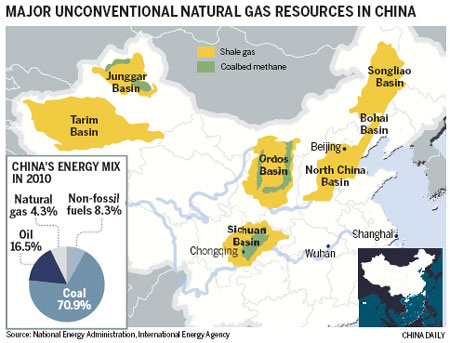Game changer

Global draw
|
Adi Karev, global head of the oil and gas practice at Deloitte, says the Chinese shale gas industry is an "attractive proposition". Provided to China Daily |
Most of the world's biggest oil companies, including Exxon Mobil Corp, Chevron Corp, BP Plc and Norway's biggest energy conglomerate, Statoil ASA, are participating in China's shale gas development. Royal Dutch Shell is the first and only company that has signed a production-sharing contract with China National Petroleum Corp, the nation's biggest oil company.
However, they have limited their involvement in China to the minimum by mostly setting up joint studies and joint assessment on shale gas wells with their Chinese counterparts.
One of the reasons why foreign companies are not too enthused by the shale gas prospects in China is the fact that foreign companies are not allowed to participate in bidding for shale gas blocks directly.
|
||||
There are also other regulatory hurdles, says Karev. "It is true that there are lots of potential gas reserves in China. But companies must also understand the braider regulatory framework that is in existence in other countries. For example, the US has one of the most open markets in the world," Karev says.
Chen Weidong from CNOOC says that the US shale gas sector saw overseas investments of more than $23 billion between 2009 and 2011. Of this, at least $4 billion came from China's State-owned enterprises.
Industry experts say that the global outreach moves of Chinese SOEs are not only for gaining insights on shale gas development, but also for profits.
CNOOC Ltd has recently agreed to pay $15.1 billion in cash to acquire Nexen Inc, the Calgary-based oil and gas producer, whose assets include shale gas, in the biggest overseas acquisition by a Chinese company.
PetroChina signed a binding agreement in February to purchase a 20 percent stake in Shell's Groundbirch gas assets in Canada.
Sinopec has decided to invest $2.2 billion for a third of the US oil and natural gas producer Devon Energy Corp's interests in five developing fields.
Sinopec is also reported to be in talks with US gas producer Chesapeake Energy for its multibillion-dollar shale gas assets.
"Between 2009 and 2011, China's investment in the shale gas sector was less than $1 billion," Chen says.
Action plan
"If we want to achieve the production target of 6.5 billion cu m a year by 2015, we need to invest at least $20 billion," Chen says, adding that shale gas development in China needs more than just rhetoric.
With the second auction for shale gas blocks coming up in China, there is bound to be a frenzy of activity among global companies to grab a share of the pie. There are already reports that some 70 companies have evinced interest in the bidding process, according to sources from the Ministry of Land and Resources.
Foreign companies, however, are not allowed to participate in the bidding process directly, but can team up with Chinese companies that win the bid, provided its stake is no more than 49 percent in the joint venture.
Royal Dutch Shell, the world's largest energy company by revenue, has already showed interests in such an approach in China.
Lim Haw-kuang, the executive chairman of Shell China Group, had during a recent meeting indicated that the global oil major was keen to participate in China's unconventional gas exploitation projects, especially shale gas.
"I am anxiously waiting for the second shale gas tender," he said, adding that Shell is willing to cooperate with the Chinese companies that win the tender.
Despite all these risks, Karev from Deloitte still considers the Chinese shale gas industry as an "attractive proposition".
"In most of the other countries, companies have to drill some gas forts and then sell it. There are no such conditions in China. The reserves are here and so also the market. It is a perfect combination.
"In theory, there is a lot of money that can be made from China. Despite the risks, companies are still wary of being involved in such a large playground like China. So they will want to get in, but with baby steps," Karev says.
mengjing@chinadaily.com.cn

(China Daily 08/03/2012 page1)
Today's Top News
- Key steps to boost RMB's intl standing highlighted
- Sustained fight against corruption urged
- Xi calls for promotion of spirit of volunteerism
- Xi calls for promoting volunteer spirit to serve national rejuvenation
- Xi chairs CPC meeting to review report on central discipline inspection
- Reunification will only make Taiwan better



































